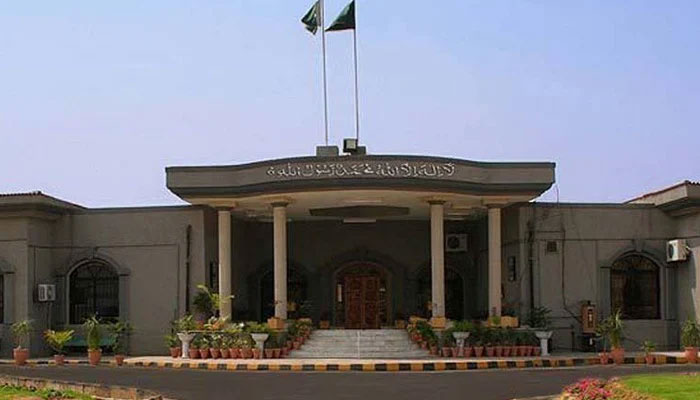IHC stops govt from making arrests under Section 20 of PECA ordinance
“Secretary interior ministry and DG FIA will be responsible if the SOPs are not followed,” warns Justice Minallah
ISLAMABAD: The Islamabad High Court (IHC) Wednesday ordered the government not to make arrests under Section 20 of the recently promulgated Prevention of Electronic Crimes (Amendment) Act ordinance 2022.
President Dr Arif Alvi had promulgated an ordinance on February 20 to amend the PECA, 2016, making online defamation a non-bailable, cognisable offence. After the amendment, the jail term for demotion has also been increased from three years to five years while giving more powers to the FIA.
A day earlier the Pakistan Federal Union of Journalists (PFUJ) had moved the IHC against the PECA ordinance 2022.
Taking up the PFUJ’s petition, IHC Chief Justice Athar Minallah issued a notice to the government and restrained it from arresting people under the ordinance.
At the outset of today’s hearing, PFUJ’s counsel Adil Aziz Qazi argued that the government deliberately postponed a scheduled session of the National Assembly (NA) on February 18 to introduce this ordinance.
“What were the circumstances under which the government issued the ordinance in haste?” questioned the lawyer.
At this, the judge remarked that the FIA had already submitted SOPs relating to raids and arrests. The court ordered that nobody should be arrested on any complaint registered under Section 20.
“Secretary interior ministry and DG FIA will be responsible if the SOPs are not followed,” warned Justice Minallah.
“There should be no defamation law for public representatives”, remarked Justice Minallah.
Meanwhile, the court sought assistance from the attorney general of Pakistan in the case and adjourned the hearing till February 24.
Amendments to Section 20 of PECA law:
a- In the marginal heading, the word “natural shall be omitted.
b- In sub-section (1) the world “natural” shall be omitted and for the world “three” the word “five” shall be substituted (2) and for colon at the end, a full stop shall be substituted and thereafter the proviso shall be omitted.
c- After sub-section (1), amended as aforesaid, the following new sub-section shall be inserted, namely-
“(1A) The informant or complainant in respect of offence under sub-section (1) shall be an aggrieved person, his authorized representative, or his guardian, where such person is a minor or a member of the public in respect of a public figure or a holder of public office,” and
d- In sub-section (2), for the expression “Any aggrieved person or his guardian, where such person is minor,” the expression “Any aggrieved person, his authorised representative, or his guardian, where such person is minor, or a member of the public in respect of a public figure or holder of public office” shall be substituted.
Here, three years imprisonment for defamation has been increased to five years and the section about PEMRA has been removed. While two new paras have been added to the act.
The journalists bodies, human rights organisations, bar councils and political parties have raised serious objections over the government's move and have termed it an attempt to stifle media.
-
Security forces gun down 30 terrorists in multiple IBOs in KP: ISPR
-
MQM-P calls for new province in Sindh
-
US report validates Pakistan military edge over India: PM
-
Banned TTP poses serious threat to Pakistan security: UNSC panel
-
CM Afridi clarifies remarks on by-poll after ECP requests army deployment
-
Dubai sees 3.2m Pakistani passengers in 2025 as airport sets new milestone
-
Security forces kill 23 Indian proxy terrorists in KP's Kurram
-
Pakistan to construct island to boost oil exploration: report













